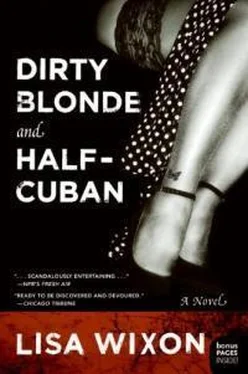Lisa Wixon - Dirty Blonde and Half-Cuban
Здесь есть возможность читать онлайн «Lisa Wixon - Dirty Blonde and Half-Cuban» весь текст электронной книги совершенно бесплатно (целиком полную версию без сокращений). В некоторых случаях можно слушать аудио, скачать через торрент в формате fb2 и присутствует краткое содержание. Жанр: Современная проза, на английском языке. Описание произведения, (предисловие) а так же отзывы посетителей доступны на портале библиотеки ЛибКат.
- Название:Dirty Blonde and Half-Cuban
- Автор:
- Жанр:
- Год:неизвестен
- ISBN:нет данных
- Рейтинг книги:4 / 5. Голосов: 1
-
Избранное:Добавить в избранное
- Отзывы:
-
Ваша оценка:
- 80
- 1
- 2
- 3
- 4
- 5
Dirty Blonde and Half-Cuban: краткое содержание, описание и аннотация
Предлагаем к чтению аннотацию, описание, краткое содержание или предисловие (зависит от того, что написал сам автор книги «Dirty Blonde and Half-Cuban»). Если вы не нашли необходимую информацию о книге — напишите в комментариях, мы постараемся отыскать её.
Dirty Blonde and Half-Cuban — читать онлайн бесплатно полную книгу (весь текст) целиком
Ниже представлен текст книги, разбитый по страницам. Система сохранения места последней прочитанной страницы, позволяет с удобством читать онлайн бесплатно книгу «Dirty Blonde and Half-Cuban», без необходимости каждый раз заново искать на чём Вы остановились. Поставьте закладку, и сможете в любой момент перейти на страницу, на которой закончили чтение.
Интервал:
Закладка:
At this, Daya and I laugh.
ALL THROUGH THE night there’s music and dancing and then stories about José Antonio and a blonde toddler who left with her norteamericanamother. And how, twenty-three years later, she sat in the bushes across from the house, too scared to walk in and say hello. There is speculation at how many times we may have passed each other in crowded streets, and I tell them of the eerie preciseness of the Santería priest’s geography.
My family is loud and funny and loves their rum. Growing up an only child, with no cousins on either side, I’m overwhelmed by the multitude of names I’m expected to remember, or how we all relate in our complex web.
My cousin Manuel and his boyfriend Paulo rectify the situation by grabbing exotic fruits from the kitchen and arranging them on the floor. A banana is an uncle. A melon is an aunt. Mangoes and guayabasand fruta bombacorrespond to the personalities and physicalities of my many cousins, and no one can stop protesting their assigned vegetation.
As the imagery of my extended family begins to form in my mind, they bombard me with questions as well. Where did I grow up? Why so many countries? Wasn’t my mother in love with José Antonio? What does John think of me looking for José Antonio? And then the one everyone hangs on: Once I meet my father, am I going to return to the U.S.?
At this, I catch Rafael’s expectant stare. He’s been at my side all night, and I’ve found myself studying his profile, his relaxation as he moves through crowds, the way people’s eyes linger on him. Not letting it go to his head. With ease, he makes fast friends with those he doesn’t know, crafting with them the fraternal bonds of those whose daily life is the same kind of weird hardships, the same shortages, and the inventandothat spurs a motivation and rewards cleverness.
Shortly after midnight, a blackout shuts down city lights. The backyard at Calle M is aglow with candles, and neighbors without them make their way over to the raucous fiesta. Everyone is dancing casinoto Charanga Forever,even my abuela,who grabs my hands and shows no chagrin at my waxen hips.
“ Mi niña,I taught you well,” she says, happily taking credit for my skills.
Camila tosses me a snide glance and raises her glass. “Candela.”
Everyone smiles. Tito barks. But Rafael’s face tightens. In the rhythm of a new romance, the natural time for first sex is upon us. But later, at his house, the candles flickering in his bedroom, the music setting an easy tempo, I suffer stage fright before my jeans fully unzip. It’ll be enough to have to leave my father and return to my country, I don’t want to also be missing Rafael. It would be too much to bear.
62
T he cells distributedthroughout our bodies contain the evidence of memory. If our hippocampus—the area of our brains that recalls memory—is injured, the cells in our bodies provide a backup, albeit a hazy one. It’s a phenomenon that psychiatrists and scientists hold in awe.
Cells are also believed to hold the memory of their own particular history. Collectively, the cells in an injured knee will forever recall the pain. A torn ligament remembers its past. And I also believe that cells retain the memory of senses, the feel of long-ago touch and the sound waves produced by the voice of loved ones.
The cells in my body from childhood, despite long having flaked off and regenerated, are being put to the task today. Because today is the day José Antonio arrives at José Martí International on a charter flight from Miami.
My grandmother had offered to come to the airport, for moral support. But like every similar invitation from friends and family, I’ve declined. I believe I can recognize my father. Knowing my cells’ memory shall prove a guide.
Terminal 2 is where most charter flights land, and where I show up several hours before the flight is scheduled to arrive. “Terminal” comes from the Latin and means boundary, or the place that connects one life to another. The word is derived from an ending, and I know this Havana terminal will deliver an end to a life without my father, and the beginning of one with him. Or so I hope. Will he know how far I’d gone to find him? How many humiliations I’d suffered along my journey? Will he know from my face, today a year older and slightly lined, that I’d become a modern-day version of the Greek’s renowned hetaerae?
Three hours in the theater of the terminal are spent pondering my upcoming fate. I watch families part. The wealthy leaving for abroad, the poor returning to their daily inventando.Will a similar farewell play out with José Antonio and me in a few short weeks, when my papers are cleared and I’m allowed to return to my other homeland?
In the heat, perspiration forms on my face. The humidity wrinkles the suit Camila had lent me—quite possibly the most conservative outfit ever to hang in a cubana’s closet, and one procured on her trip to the Middle East. (“I’d last one minute where fashion says to wear a blanket on your head,” Camila had said.)
Smoothing down the imperfections, I feel a hand on my shoulder, and my skin goes cold. When I look up, I realize no one is there. Gratitude warms my freezing skin. I knew she wouldn’t let me do this alone.
I feel him somewhere, too, and I stand up, as if on my mother’s directive. My eyes scan the crowd and then I see him walking through the gate. He drops his heavy bags. Looks straight at me.
It’s a long, long moment, and it is spent in the irises of each other’s eyes. José Antonio. My father.
I run to him.
PROTESTS BEGAN AT dawn. A million people were rousted from work and sleep, from cities and villages, and now bang their fists in the air. Spain and Italy are being denounced today as fascist, a direct retaliation for their vote in the European Union, one that would punish Cuba economically for imprisoning its dissidents and killing the hijackers a mere three days after a summary trial.
Crowds stall traffic. The taxi driver throws up his hands. My father appeals to him to drop us in the Jewish quarter of the old city. We drag his bags to the Hotel Raquel, a restored Art Nouveau building on Calle Amargura, near the St. Francis of Assisi Square. In the cool lobby restaurant, the Garden of Eden, we find a paradisiacal respite from the heat and anger just a few blocks away.
“I want an egg,” says José Antonio in a low voice, as if it were a forbidden fruit. “I dream of the eggs in my country. I’ve been dreaming about them for twenty years.”
I can’t look at him, I’m so nervous. I stare down at my menu, unseeing. José Antonio takes my hand.
“I’ve been dreaming about finding my daughter for longer.”
My father is the physical antithesis of my stepfather, John. He’s medium-built, with broad shoulders and a quick, sincere smile that spreads across his face like honey on toast. His dark hair is framed by graying edges, and I’m pleased he doesn’t follow the Cuban male custom of erasing grays with flat, black dye. He’s stocky and strong and with an unfettered energy that belies his fifty-three years. But it’s José Antonio’s eyes that bring the most happiness. They can’t seem to look away from me.
Here we are, ordering breakfast. The two of us. Like a normal father and daughter dining together at a Caribbean hotel.
“There are about twelve hundred Jewish Cubans still living here,” he says, chattering nervously. “The government allows them to buy beef for pesos.” My father is referring to the widespread shortage of beef, available only at expensive dollar stores, and the draconian laws preventing anyone from slaughtering cows or buying black-market steak. “The temple is around the corner. I remember it from when I was young. Most of the Jewish folks left just after the revolution. They’d built successful businesses, and weren’t interested in living without that opportunity.”
Читать дальшеИнтервал:
Закладка:
Похожие книги на «Dirty Blonde and Half-Cuban»
Представляем Вашему вниманию похожие книги на «Dirty Blonde and Half-Cuban» списком для выбора. Мы отобрали схожую по названию и смыслу литературу в надежде предоставить читателям больше вариантов отыскать новые, интересные, ещё непрочитанные произведения.
Обсуждение, отзывы о книге «Dirty Blonde and Half-Cuban» и просто собственные мнения читателей. Оставьте ваши комментарии, напишите, что Вы думаете о произведении, его смысле или главных героях. Укажите что конкретно понравилось, а что нет, и почему Вы так считаете.












